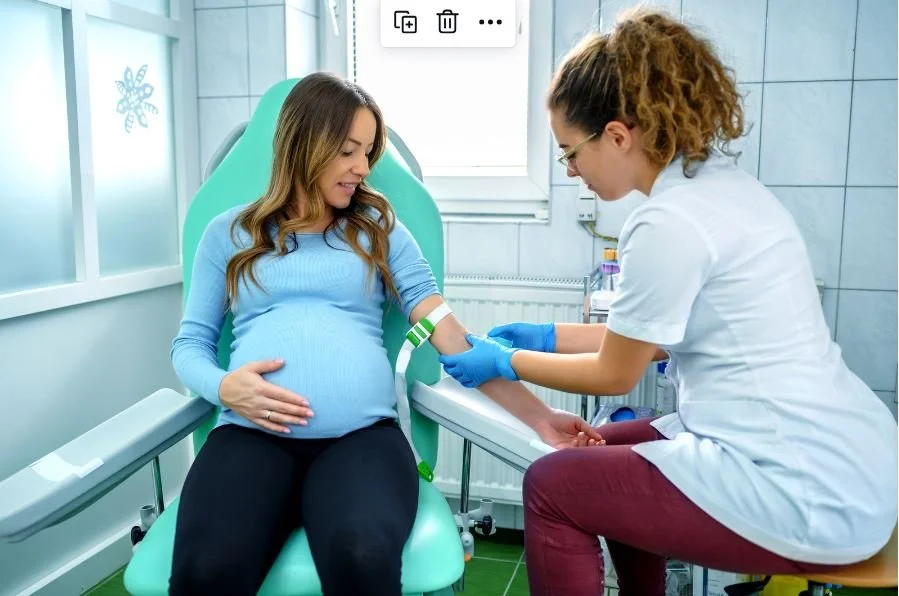
Hepatitis B Virus and Pregnancy
Hepatitis B is a serious liver infection caused by the hepatitis B virus (HBV). While there is no cure for hepatitis B, treatment is available that can manage the infection and reduce the risk of long-term health problems. A safe and effective vaccine is also available to protect against hepatitis B infection.
HBV spreads through contact with blood or other body fluids from a person with hepatitis B, including saliva, semen, and vaginal fluids. HBV can also pass from mother to baby during pregnancy and delivery. However, steps can be taken to greatly reduce the risk of infection in babies born to people with hepatitis B.
-
Hepatitis B virus can cause a chronic (long-lasting) liver infection. The liver is a major organ that helps the body get rid of toxins and makes important proteins.
When an adult first gets hepatitis B, they may have symptoms like fever, nausea, tiredness, stomach pain, or yellowish color changes of the skin and eyes (jaundice). Most infants with hepatitis B do not show any symptoms.
In most adults with hepatitis B, the virus goes away without treatment. About 5% will develop chronic hepatitis B infection. Babies with hepatitis B have a much higher risk of chronic infection. Up to 90% of infants who get HBV during pregnancy or delivery will go on to develop chronic hepatitis B. Left untreated, about 1in 4 children with chronic hepatitis B will eventually die of health problems related to their infection, such as liver damage, liver disease, or liver cancer.
-
HBV is spread by contact with the blood or body fluids of a person with hepatitis B. The virus can also pass from a pregnant person with hepatitis B to the baby either during pregnancy or during delivery.
-
Yes. All pregnant people should be tested for hepatitis B during each pregnancy with a simple blood test.
-
A vaccine is available to protect against hepatitis B. It is recommended for all infants at birth, children not vaccinated as babies, adults aged 19 to 59, and adults over 60 with certain risk factors. Pregnant people who haven’t been vaccinated against hepatitis B infection can also get the hepatitis B vaccine. There is no virus in the hepatitis B vaccine, and it is safe for both the pregnant person and the baby.
-
The main concern during pregnancy and delivery is that HBV may be passed to the baby. The chance of this happening is related to the viral load, which is the amount of HBV in your blood. Your healthcare professional will monitor your viral load throughout your pregnancy with blood tests. If you have a very high viral load, treatment with antiviral medication may be recommended in the third trimester of pregnancy. This treatment will help lower the level of HBV in your body and decrease the chances of the virus passing to the baby. If your viral load is low, the baby will still receive preventive treatment after delivery to prevent infection.
-
If you have hepatitis B and are pregnant, you will have ongoing tests of your liver function and your viral levels. You may be referred to a maternal-fetal medicine subspecialist or hepatologist (liver specialist) for specialized care. If you are already being treated for hepatitis B when you get pregnant, your healthcare professional will review your current medications to make sure they are safe during pregnancy. If you have been taking tenofovir acetate fumarate (TAF) or tenofovir disoproxil fumarate (TDF) to treat hepatitis B before pregnancy, you can continue taking it throughout pregnancy. Entecavir (Baraclude) is not recommended for use during pregnancy.
-
A planned cesarean delivery isn’t necessary if you have hepatitis B. Vaginal delivery does not appear to increase the risk of the baby getting the virus. Certain measures will be taken at the time of delivery to decrease the risk to the baby.
-
The following steps can be taken to greatly reduce the risk of infection in babies born to moms with hepatitis B:
Immediate post-birth care: Babies born to mothers with hepatitis B should receive a medication called hepatitis B immunoglobulin (HBIG) and a dose of the hepatitis B vaccine within 12 hours of birth.
Completing the hepatitis B vaccine series: Babies should get the hepatitis B vaccine series on schedule. The hepatitis B vaccine series is given in 2 or 3 doses (depending on the type of vaccine given) over a few months. The baby needs all recommended doses in addition to the dose given at birth to be as protected as possible.
Testing: Babies should be tested for hepatitis B between 9 and 12 months of age. Testing can show whether the baby is protected, infected, or still at risk for infection.
-
Even with these preventive steps, about 1 in 10 babies become infected with HBV. Your baby will need special care to manage the disease. When bringing the baby home, precautions should be taken to avoid passing the virus to others.
-
Your family and household members should know how HBV is passed from one person to another and take steps to prevent infection spread. All of your family and household members should be tested for hepatitis B. They should get the hepatitis B vaccine if they do not currently have hepatitis B but are not immune to it.
-
Anyone with hepatitis B should be tested for hepatitis A virus (HAV) and get vaccinated if they’ve never had it before. The hepatitis A vaccine can be given during pregnancy. Hepatitis A can cause more serious liver damage in a person with hepatitis B.
People with hepatitis B need to avoid all alcohol, even when not pregnant.
Quick Facts
Hepatitis B is caused by the hepatitis B virus (HBV). The virus can pass from a pregnant person with hepatitis B to the baby during pregnancy and delivery.
Preventive steps can be taken to greatly reduce the risk of infection in a baby born to a person with hepatitis B.
Hepatitis B can occur without any symptoms.
All pregnant people should be tested for HBV early in pregnancy.
There is no cure for hepatitis B, but antiviral medication can help decrease the risk of long-term health problems.
A planned cesarean delivery is not necessary for pregnant people with hepatitis B.
Breastfeeding is safe for people with hepatitis B.
Your baby will need to complete the hepatitis B vaccine series on schedule and have a blood test to make sure they are protected against hepatitis B.
Glossary
Antiviral Medications: Drugs that treat viral infections.
Cesarean Delivery: Surgery in which a baby is delivered through a cut (incision) in the mother’s uterus.
HBV Immunoglobulin (HBIG): A medication containing antibodies used to prevent HBV infection in people exposed to the virus.
Immune: Being resistant to a specific disease because the body has made antibodies against it, either through vaccination or having the disease before.
Jaundice: A yellowish coloration of the skin and whites of the eyes caused by too much bilirubin in the bloodstream.
Maternal-fetal medicine subspecialist: An obstetrician with specialized training in prenatal care for people with high-risk pregnancies.
Vaccine: A substance containing parts of an inactivated or killed version of a disease-causing agent that causes a person’s immune system to make antibodies that fight the disease.
Viral Load: The amount of a virus in a person’s body.
Last Updated: April 2023
This resource was supported by the Society for Maternal-Fetal Medicine (SMFM) and the Centers for Disease Control and Prevention (CDC) cooperative agreement
CDC-RFA-DD-23-0004 Enhancing Partnerships to Address Birth Defects, Infant Disorders and Related Conditions, and the Health of Pregnant and Postpartum People.
The views expressed by the authors do not necessarily reflect the official policies of the Department of Health and Human Services nor represent an endorsement by the U.S. Government.
